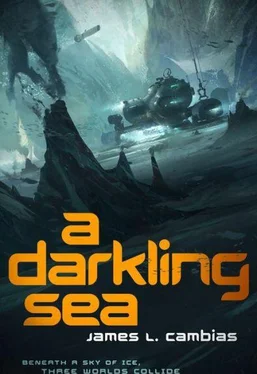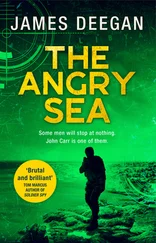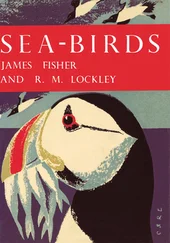Two days after the Guardians arrived, the first humans left the station. Gishora chose three to ride the elevator: Maria Husquavara, Anand Gupta, and Pedro Souza. He put Tizhos in charge of removing them.
The first two went peacefully to the elevator, carrying their own gear. But Souza objected, and sat in his room.
“Are you going to shoot me, then?” he demanded, gesturing at the Guardians’ holstered handguns.
Tizhos tried to reason with him. “I see no need for violence. I feel sure you understand that you cannot remain here. We all wish to avoid conflict. Therefore you should come along now.”
He began singing loudly, ignoring her. Tizhos began to feel frustrated. She made a logical argument, and humans respected logic. For him to refuse made no sense.
“Your behavior seems irrational. It accomplishes nothing. It only produces conflict, which we all wish to avoid.”
“Do we? I’m not going without a fight. We shall oooverCOME—some—day! ”
It felt like a failure when Tizhos turned to the Guardians. “Carry him to the elevator. Treat him gently.”
Rinora, the biggest Guardian, went into the human’s room and grabbed him with arms and midlimbs. Souza continued singing loudly as the Sholen carried him from the room to the elevator. Nearly half the station complement crowded into the common room, with Guardians holding them back from the elevator docking hatch. As Rinora carried Souza through the room, some of the other humans began singing along with him.
The tension grew almost palpable. Tizhos caught the scents of aggression and fear from the Guardians, and it didn’t take an alien psychology expert to see the humans’ anger. The crowd in the common room pressed against the outstretched midlimbs of the Guardians, but the Sholen held their places and deposited Souza in the elevator. Tizhos herself fastened the hatches and then typed the command to start the elevator on its long slow climb. She had removed the internal controls to prevent the occupants interfering.
“What if the humans open the hatch?” Gishora had asked.
“Then they drown,” she said. “We cannot prevent them from behaving stupidly.”
Broadtail sleeps and eats a great deal, then helps Oneclaw put the camp in order. In practice this means Broadtail does the work and the old teacher makes a series of mostly irrelevant suggestions. Broadtail suspects he knows why Oneclaw’s other helpers are gone. However, the work is satisfying; Broadtail realizes he misses having property to tend.
First he repairs the catch-nets, and rearranges them so that the upstream ones aren’t blocking the others. The waters around here are mostly lifeless, but something might be attracted by the tastes of food and waste in the camp. The fibers of Oneclaw’s nets are full of knots and little side-strands tied on, and Broadtail is a little shocked to realize the nets are made of old books.
“Don’t worry,” Oneclaw reassures him when he mentions it. “I don’t use my books for net-mending or braiding into rope until they are frayed beyond repair. Often I have my students make new copies before I get rid of the old reels. A school goes through cord almost as fast as it uses food.”
The shelter is in reasonably good shape, though Broadtail does wish it were bigger. He can’t pull it down and build a bigger one without more help than Oneclaw can provide. But he can clean out some of the accumulated silt and the incredible clutter of Oneclaw’s possessions. The two of them have a fairly fierce argument about getting rid of things, and at last Broadtail consents to simply move all the pieces of broken jars, frayed and tangled books, bits of shell and bone, and other trash to a cache outside the shelter, rather than dumping them in the midden at the edge of the camp.
Oneclaw sorts through all the rubbish, separating the stuff Broadtail may remove from the things he absolutely cannot part with. Among the treasures Broadtail catches a curious echo, and moves closer to feel the object.
“What is this?” He feels it carefully with his feeding tendrils. Part of it seems to be an ordinary siphon, but the outflow goes into a stone with several holes bored in it.
“A noisemaker,” says Oneclaw.
“A what?”
Oneclaw takes the device in his good pincer, holds the siphon plunger in his feeding tendrils and pumps it vigorously. The water rushing through the bored stone makes a hideous high-pitched sound and for a moment Broadtail cannot hear anything else. The room is obscured in confusing echoes.
“Where does this come from?”
“It is my own creation. There is a passage in Swiftswimmer 11 Stonymound’s On Currents and Vents about a device found among the ruined square shelters in the Long Rift, which makes sounds of different pitch depending on how much flow there is in a pipe. I remember reading the passage and trying to make my own. This is the result.”
“I am impressed!” Broadtail feels like an apprentice for a moment, amazed by the knowledge of an adult. But he is also a little bit disappointed—he remembers the faint hope that such a strange object might be the work of the mysterious four-limbed creatures.
“I remember you saying something about a ruin near here. Do you remember exploring it?”
“Only once. You wish to go poking about an old city? Remember you are a schoolteacher now! We have work to do, and cannot indulge in scholarship.”
“Don’t worry. I intend doing all my work. But, yes, I also hope to visit the ruin. I’m interested in strange things.”
The day after the first load of prisoners went up in the elevator, Rob was in the workshop, cleaning up. Not packing—despite the presence of the soldiers, the staff of Hitode Station still adamantly refused to cooperate. But there was always mildew and crud to fight, so Rob took up a sponge and some ammonia and scrubbed the walls as though they weren’t going to abandon the station in a month.
Dr. Sen tapped quietly on the door, then came in and shut it behind him. “Robert, if I remember correctly you cast your vote for the policy of passive resis tance at the meeting.”
“Uh, yeah. I did.”
“I confess I am a little bit curious about why you selected that particular option rather than one of the other two possibilities.”
“Well, they didn’t make much sense. I mean, maybe it would have been cool to grab Tizhos and Gishora and stuff them into the elevator, but what would happen then? They’d come back with more goons and weapons, and we’d be the ones getting roughed up. Kind of like what happened anyway. They’re the giant flaming turtle here, and we’re just little Japanese guys with electric tanks.”
“I think I understand what you mean. And what are your objections to simply doing what the Sholen have asked us to do?”
“Oh, I guess I don’t like being bullied. And it all feels like there’s some kind of big symbolic thing going on here, like we’re not really the issue. I get the idea this is all for the benefit of people on Earth and Shalina.”
“That is a very perceptive thing for you to say. And now I wish to ask you another question, if you don’t mind: do you know that I am aware of your little project with Dr. Graves?”
Oh, shit, Rob thought. “Uh, no. Look, I’m sorry about that. I guess it was kind of childish, but—”
“It was extremely childish, to be accurate. In any other circumstances, I would almost certainly send you directly back to Earth on the next support vehicle. However, given what has happened here in the past few days, I am going to overlook your actions. The fact that you appear to be willing to take some considerable risks in order to defy the Sholen makes you very suitable for another little clandestine project you may wish to put in motion.”
Читать дальше












